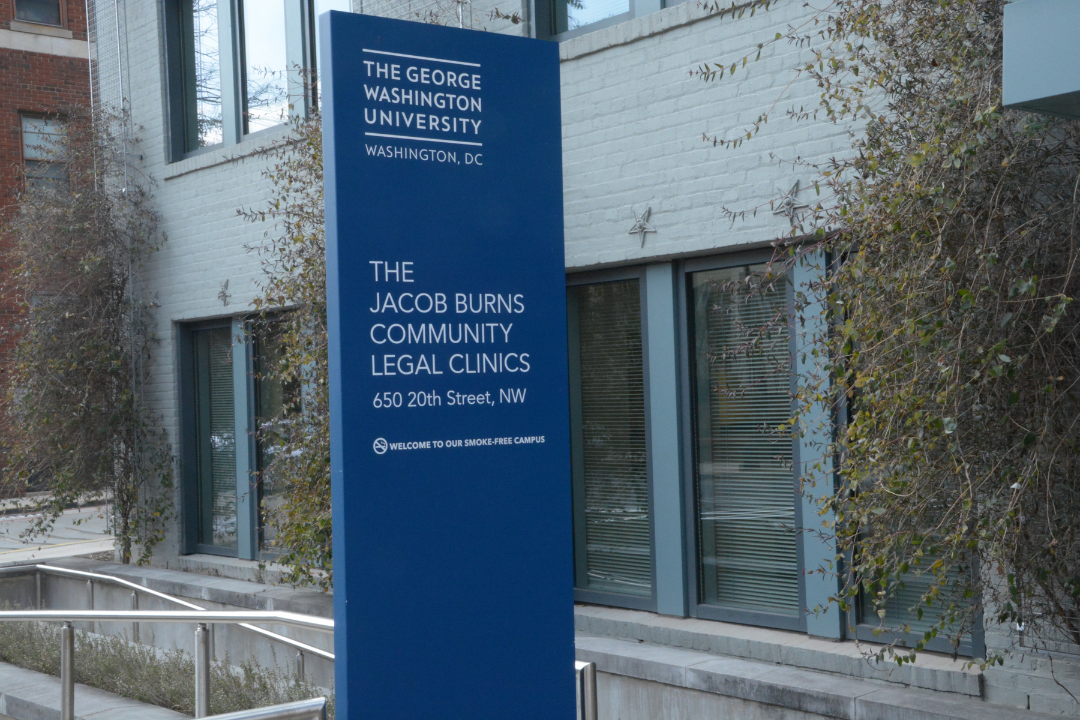In alignment with GW Law's strategic plan, GW Law's Jacob Burns Community Legal Clinics will launch 5 brand-new clinics in the Fall 2023. These clinics will expand the Program’s practice areas, draw in a wider range of faculty, and enlarge the number of seats in the Clinical Program. For more information on GW Law's Jacob Burns Community Legal Clinics, click here.
Health Equity Policy & Advocacy Clinic
Professor Emily Benfer, an expert in medical legal partnerships and one of GW Law’s newest tenured faculty members, will launch the Health Equity Policy & Advocacy Clinic. A medical-legal partnership and community-based program, this clinic will focus on fundamental lawyering skills and interprofessional collaboration taught through direct client representation, policy advocacy, and community collaboration. As members of the healthcare team at a Federally Qualified Health Center, students will represent patients who are experiencing health-harming legal issues, such as substandard conditions in housing. Students will be responsible for every aspect of the case, including interviewing, fact investigation, legal research and drafting, client counseling, negotiation, and court representation. In addition, students will collaborate with medical and public health practitioners, students, and community groups to engage in policy advocacy that addresses barriers to health in low-income and historically marginalized communities. This clinic will expand the Program’s opportunities in policy work, housing, and interprofessional collaboration, and will enhance GW Law’s health law program.
Civil Access to Justice Clinic - Education Access Advocacy Division
This clinic, directed by Assistant Dean David M. Johnson, will focus on representing D.C. Public Schools (DCPS) students in suspension hearings at the D.C. Office of Administrative Hearings. Suspension cases, which must be heard in a matter of days, involve intense trial preparation and fact investigation. Students will interview and counsel clients, collaborate, and prepare for all facets of a hearing: opening, direct, cross, objections, evidence, and closing. In the classroom, students will focus on advocacy skills, relevant regulations, and Constitutional law relevant to school suspensions. This clinic will expand the Program’s practice areas into education advocacy to meet community demand and student interest.
Civil Access to Justice Clinic - Nonprofit & Entrepreneurship Division (NEC)
Taught by Professor Darryl J. Maxwell who has taught the Small Business and Community Economic Development Clinic and is the Director of the D.C. Bar Pro Bono Center’s Nonprofit & Small Business Legal Assistance Program, this clinic will involve a docket of transactional matters. Students in this clinic will focus on short-term counseling in a broad range of small business and nonprofit legal matters, including assisting with the formation of corporations, limited liability companies, drafting contracts, and providing assistance with tax issues for local businesses, and nonprofit organizations. This clinic will provide enhanced opportunities to students who seek experiential learning in transactional law and will simultaneously provide critical legal representation to nonprofits and entrepreneurs.
Civil Access to Justice Clinic - Prison Civil Rights Division
Professor Stephen A. Saltzburg, who will teach a clinical course for the first time in his extensive and impactful career, will direct a clinic that focuses on addressing barriers to justice for prisoners seeking civil redress for state mistreatment. Students will work on and be exposed to various stages of civil torts litigation as they collaborate with a litigation team representing the family of a deceased Maryland incarcerated person who was murdered by other inmates while prison guards stood by and failed to intervene. This clinic will expand the Program’s legal work into civil rights litigation and will initiate an important aspect of GW Law’s strategic plan by fostering greater collaboration between the clinical and traditional faculties.
Civil Access to Justic Clinic - Workers' Rights Division
Professor Robin Rachel Runge will launch the Worker’s Rights Division which will provide legal assistance to low wage workers who have been denied the employment rights. Claims may include wage theft, prohibited discrimination and/or harassment, denial of leave from work and improper denial of unemployment benefits. From assessing whether there has been a violation of law, helping draft a demand letter to their employer, and/or to filing a charge with an administrative agency for lost wages or for unemployment insurance benefits, students in this clinic will work to address the exploitation of low-wage workers.
Students in each of the final four clinics will work closely with other divisions of the Civil Access to Justice Clinic to collaboratively consider and respond to the barriers to accessing the civil legal system and the lack of representation in cases of vital importance.


